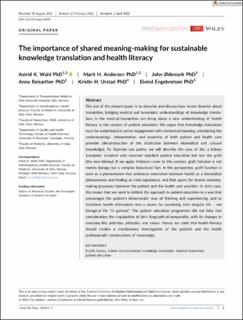| dc.contributor.author | Wahl, Astrid Klopstad | |
| dc.contributor.author | Andersen, Marit Helen | |
| dc.contributor.author | Ødemark, John | |
| dc.contributor.author | Reisæther, Anna | |
| dc.contributor.author | Urstad, Kristin Hjorthaug | |
| dc.contributor.author | Engebretsen, Eivind | |
| dc.date.accessioned | 2023-03-21T09:12:49Z | |
| dc.date.available | 2023-03-21T09:12:49Z | |
| dc.date.created | 2022-06-01T13:37:00Z | |
| dc.date.issued | 2022 | |
| dc.identifier.citation | Wahl, A. K., Andersen, M. H., Ødemark, J., Reisæther, A., Urstad, K. H., & Engebretsen, E. (2022). The importance of shared meaning‐making for sustainable knowledge translation and health literacy. Journal of evaluation in clinical practice, 28(5), 828-834. | en_US |
| dc.identifier.issn | 1356-1294 | |
| dc.identifier.uri | https://hdl.handle.net/11250/3059440 | |
| dc.description.abstract | The aim of the present paper is to describe and discuss how recent theories about translation, bridging medical and humanistic understandings of knowledge translation, in the medical humanities can bring about a new understanding of health literacy in the context of patient education. We argue that knowledge translation must be understood as active engagement with contextual meaning, considering the understandings, interpretation, and expertise of both patient and health care provider (deconstruction of the distinction between biomedical and cultural knowledge). To illustrate our points, we will describe the case of Jim, a kidney transplant recipient who received standard patient education but lost the graft (the new kidney). If we apply Kristeva's view to this context, graft function is not merely biology but a complex biocultural fact. In this perspective, graft function is seen as a phenomenon that embraces translation between health as a biomedical phenomenon and healing as lived experience, and that opens for shared meaning-making processes between the patient and the health care provider. In Jim's case, this means that we need to rethink the approach to patient education in a way that encourages the patient's idiosyncratic way of thinking and experiencing, and to transform health information into a means for sustaining Jim's singular life – not biological life “in general.” The patient education programme did not take into consideration the singularities of Jim's biographical temporality, with its changes in everyday life, priorities, attitudes, and values. Hence, we claim that health literacy should involve a simultaneous interrogation of the patients and the health professional's constructions of knowledge. | en_US |
| dc.language.iso | eng | en_US |
| dc.publisher | Blackwell Publishing | en_US |
| dc.rights | Navngivelse 4.0 Internasjonal | * |
| dc.rights.uri | http://creativecommons.org/licenses/by/4.0/deed.no | * |
| dc.title | The importance of shared meaning-making for sustainable knowledge translation and health literacy | en_US |
| dc.type | Peer reviewed | en_US |
| dc.type | Journal article | en_US |
| dc.description.version | publishedVersion | en_US |
| dc.rights.holder | the authors | en_US |
| dc.subject.nsi | VDP::Medisinske Fag: 700::Klinisk medisinske fag: 750 | en_US |
| dc.source.pagenumber | 828-834 | en_US |
| dc.source.volume | 28 | en_US |
| dc.source.journal | Journal of Evaluation In Clinical Practice | en_US |
| dc.source.issue | 5 | en_US |
| dc.identifier.doi | 10.1111/jep.13690 | |
| dc.identifier.cristin | 2028746 | |
| cristin.ispublished | true | |
| cristin.fulltext | original | |
| cristin.qualitycode | 1 | |

